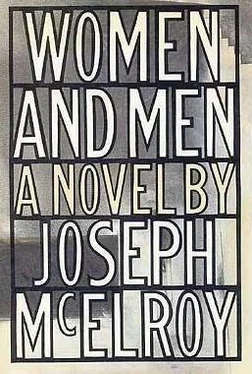At the top of the dark entry stairs where the wide, old corridor that would serve as a lobby went away to the left into the dusk of dim music and voices, a child was holding her bike. "Can you ride that bike?" he asked. "Yes. I learned in the park," the little Puerto Rican girl said. "You’re a long way from the park," he said, but the child said, "No, it’s over there," and she pointed at the stairs with a grand motion and brought her hand back gently bending to smooth one of her dark braids. "How old are you?" he asked. "Seven," she said, looking at him. "Do you ride in the streets out here?" "No, there’s too much traffic; I’m not supposed to. We go on the sidewalk and we ride in the park." "Who are you waiting for?" he asked. "My uncle," said the little girl. Rising on the far pedal, a girl’s bike, she eased back onto her saddle as she rode away down the glimmering corridor. One of the doors to the theater opened, with a sudden argument of voices, and she seemed to almost decide to ride right through but a tall young man in a khaki army jacket came through and when she didn’t brake he grabbed her handlebars and laughed, "Hey, baby." Without a word she turned her bike and came back toward Spence, who thought he was recognized and thought that in some way he would know this sauntering, cool guy. The little girl braked and stepped forward onto the floor. "How old are you?" she asked. "I don’t know," said Spence. "Are you a hundred?" "Amy," said her uncle. "No," said Spence, "I’m not a hundred, but you’re a smart girl, can you count to a hundred?" "She talks a lot," the other man said, and picking up the bike by the frame under the saddle with one hand, he took the little girl by the hand and they went down the stairs, but the little girl said, "I can carry it. Efrain! I can carry it."
The man Talca, or de Talca, was in one of the last rows, intimate of the great lady singing onstage with another woman and a large man Spence knew as Ford North. Spence and Talca became aware of each other at once, and Spence’s dangerous contact (though hardly then releasing some curl of sight that he left in motion adrift for Spence to worry about as the diva stopped and said, "I keep hearing Otello" laughed, said "Good!" and resumed) might have been sweeping the small "orchestra" with a cool hand to say to Spence, Certain people are not here:
the exile economist, for one, was not here, whose wife was particular friend to Talca’s lover onstage turning and walking away now from the big man North as if to leave with him what she had just finished singing while the composer himself was at the piano half-singing with them; and some other figure was not here:
but here Spence and Talca parted company and both felt it at a moment when Luisa turned back, like that gracious lady mayor with a white feather in her piled hair ordering a planeload of snow flown down from Nueva York for her island waifs just beginning to get wind of P.R. liberation — and Luisa sang so gladly to the audience or at least Talca if not the big man North or the tall, ghostly black girl who was in the scene too,
You ask the matter but you have forgot,
Forgot me in my inmost part which part
Is yours, yours, too
(and repeating this song so gladly) that the hammering notes of big North being nasty and the thin black singer singing high high above them seemed not to touch her and Talca’s head swayed until Talca rose to come back to Spence, a standing-room character in this give-and-take, and then she did respond to North, who half drew his sword and they acted like they would like to kill each other though singing all the time, as Talca arrived and the black singer sang
I have remembrances of yours I long
So long had longed to exchange for you
That now it feels I long have longed to re-deliver them
while North seemed to sing at both of them, left right left right,
Doubt thou the stars are fire,
Doubt then sunlight doth move
and more words that Talca (or de Talca) and Spence hardly heard:
for involved with each other even for the moments when Talca strode to a small door and disappeared and a toilet flushed instantly and he instantly returned to where Spence stood gazing at the stage, they were communicating almost too fast, like actors (though as if over each other’s shoulders) before the words like lyrics against the enthusiastic pianist-composer’s music even started uttering themselves:
Why have you followed me here? To see that Puerto Rican con who just left?
You know I like the music.
You don’t know a Fedora from a—
His name is Efrain, that’s all I know about him and his little niece was in the hall riding her bike.
He has been seen with our "friend." So what is the connection?
The prison, maybe. Which friend?
The one who is not here, said de Talca as if not to say the name.
Hortensa, the aura reader, is not here, said Spence.
Wing’s sister?
She is friends with Clara.
Who is not here either. Nor our "friend."
Oh you mean her husband.
Your client, yes. Ah, you thought I meant—
So you’re the one who got hold of that communication whatever it was.
Ah, Spence, were you there ahead of me? perhaps waiting in the Mayn wastebasket with the other shit?
I guess I haven’t had to since I’ve known you, Talca.
Quite right. Right on the button. I was intentionally rude.
Deals are deals, Talca. It doesn’t matter.
Of course. It is not a matter of style with you, Spence, you are fed up with your client the economist and you and I have interests in common anyway, your side of which I do not inquire about.
I have a wastebasket, too.
You are one, Spence. Look, I grant you the letter in question—
It sounded like more than a letter. There’s a lot between Mayn and his daughter.
Obviously, and so I will grant you the letter—
Grant me? Maybe you mean something different in your own language.
I know you speak Spanish, Spence, and we must speak it sometime if you like but what I am saying is that I grant you that I have seen the letter, O.K.? or at least the longhand draft of it; and our mutual interests will be served if you will amplify for me what is said there concerning the woman Mayga Rojas Rodriguez: you knew her when she was lobbying copper but in reality promoting Frei’s presidential future. Mayn’s young friend, how much does he know?
I may not know much, but the music is beautiful, Talca.
I can only guess all that is in your head, Spence. The music is excellent, and strangely familiar. The work is not some mere folie that North is letting his boyfriend show off; and Lady Luisa is not herself, she is waiting for something to happen. Preparation is all, as the poet says.
And you are waiting. .?
O.K., I am going back to my seat in a second: we know the letter Mayn wrote to his daughter, I at least the longhand draft. But Spence, you must tell me where are the diaries of this corrupt clan of invert begetters?
Marion Hugo Mayne you mean? The legendary Chapultepec encounter with the girl who looked like a boy.
Marion Hugo Mayne I mean. Information relating Mayga’s death to the Masons.
Talca, next thing you’ll be relating her death to the famous false ring finger Jackson had to put up with after that blood-ritual game in upper New York.
Spence, even you who do not matter may be in danger, because if this entertainingly mythical mountain approaching is code talk for an attempt on a South American President’s life by Cuban elements posing as anti- Castroist—
Is there such a thing as a South American President?
Читать дальше












